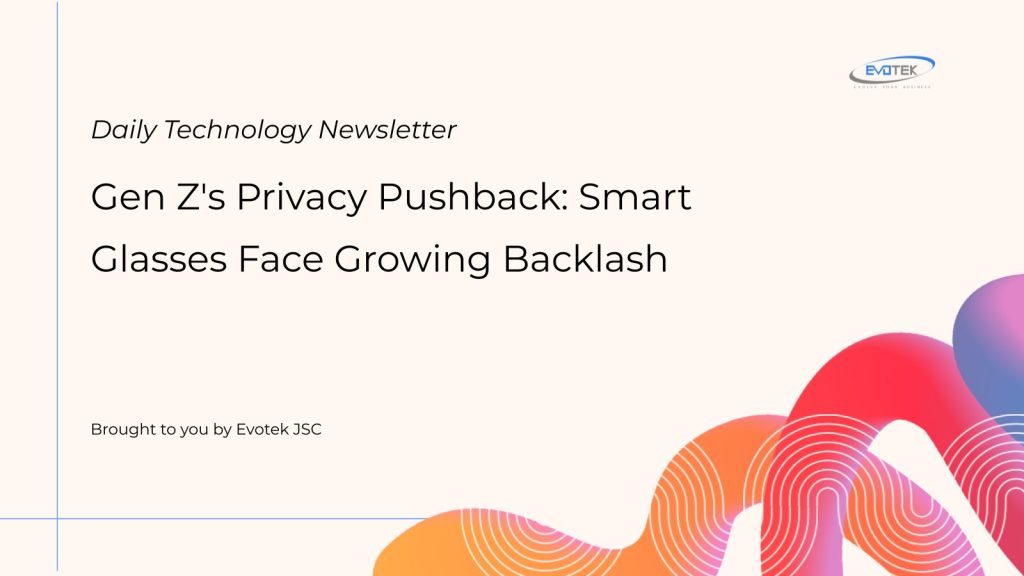A burgeoning sense of unease is taking root among younger generations as smart glasses, equipped with integrated cameras, become an increasingly common sight in public and private spaces. These wearable tech devices, touted for their hands-free convenience, are sparking significant privacy concerns, particularly among Generation Z, who perceive them as a direct challenge to personal autonomy and data control.
The debate surrounding these advanced gadgets, which include popular models like Meta Ray-Bans, escalated recently following a widely discussed incident. A TikTok user recounted a visit to a European Wax Center in Manhattan, where she was alarmed to discover her aesthetician wearing Meta Ray-Bans with a camera. Although the worker stated the device was uncharged, the experience left the user profoundly unsettled. The company later clarified that employees are instructed to keep such devices powered off during appointments, yet the episode ignited a firestorm of online criticism, fueling discussions about consent and the ethics of public recording.
Digital Exposure Fears Drive Wearable Tech Skepticism
Social media quickly transformed into a forum for voices expressing anxiety over this digital intrusion. Videos on platforms like TikTok garnered millions of views, with users articulating similar discomfort. One notable post from Vanessa Orozco, highlighting the apprehension of being filmed by customer service staff without notice, surpassed 10 million views. While some acknowledged the practical applications of these smart glasses, the overwhelming sentiment was a desire for their disappearance from everyday interactions.
The concept of smart glasses isn’t new; Google Glass made its debut over a decade ago but largely remained a niche product. Today, tech giants like Google and Meta, alongside smaller innovators, are re-entering the market with sophisticated versions featuring enhanced video cameras, microphones, and advanced AI capabilities. These devices have found a user base among content creators seeking hands-free filming options for vlogs and street interviews. However, the most significant pushback originates from Gen Z, a generation uniquely attuned to the inherent risks of digital exposure.
Beyond the Indicator Light: Gen Z Demands True Data Security
Many young individuals worry that casual, everyday interactions could be recorded without their explicit consent and subsequently shared far beyond their control. Meta spokesperson Maren Thomas addressed some of these concerns, stating that Meta Ray-Ban glasses incorporate a visible light indicator signaling when recording is active. The device also features a sensor designed to detect if the light is obstructed, and disabling this warning violates Meta’s user agreement. However, Thomas declined to elaborate on broader privacy implications.
Despite these safeguards, skepticism persists among younger consumers. Opal Nelson, a 22-year-old New York resident, voiced her concern that a simple recording indicator is insufficient to prevent misuse, especially given the proliferation of online tutorials detailing how to bypass such protections. For those in customer-facing roles, the threat of being secretly filmed by inconspicuous eyewear significantly amplifies their sense of vulnerability.
Generational Divide: Reshaping Digital Privacy Norms
Researchers observe distinct generational attitudes towards digital privacy. Alice Marwick, director at the nonprofit Data & Society, notes that while millennials often share freely on social platforms, Gen Z adopts a more cautious approach. This generation meticulously weighs the potential for unintended exposure or harassment before posting, especially as their online presence increasingly impacts job and college applications. Consequently, many Gen Z individuals establish informal boundaries with peers and family regarding social media sharing. The advent of pervasive wearable recording devices introduces a new layer of uncertainty, threatening these carefully negotiated rules and further eroding their sense of personal space.
Despite the growing debate and Gen Z’s vocal concerns, Meta’s Ray-Ban sales continue to climb in the U.S. Analysts from IDC project sales to reach four million units by year-end, a substantial increase from 1.2 million in 2024. Data from Sprout Social indicates that while roughly three-quarters of August mentions were positive or neutral, a significant portion of the negative sentiment originated from younger demographics, underscoring the ongoing tension between technological advancement and evolving privacy expectations.

 日本語
日本語 한국어
한국어 Tiếng Việt
Tiếng Việt 简体中文
简体中文